Researching Your Family's History at the Massachusetts Archives
- Introduction
- Vital Records
- Passenger Lists
- Census Schedules
- Military Records
- The Massachusetts Archives Collection
- Papers Relating to Maine
- Records of State Institutions
- Massachusetts Supreme Judicial Court Archives
- The Suffolk Files
- Naturalizations
- Divorces
- Probate
- Name Changes
- Adoptions
- Suffolk County Deeds
- African-American and Native American Resources
- Additional Collections
Introduction
The Massachusetts Archives holds the records of state government from 1629 to the present. While the Archives does not hold public records because of any inherent genealogical value, these documents can still be an important resource for people studying family history.
The Reading Room of the Massachusetts Archives is open for research all weekdays, 8:30 a.m. - 4:30 p.m., except on legal holidays.
Vital Records
Refer to our Researching Vital Records at the Massachusetts Archives page for information on our birth, marriage, and death records.
Passenger Lists
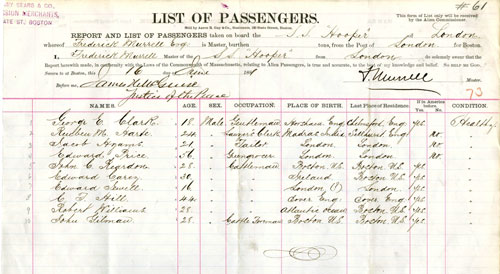
Passenger manifest for the Missouri, arriving February 15, 1882
Massachusetts officials started recording the names of immigrants who arrived by ship to the Port of Boston in 1848, a procedure that continued until 1891, when federal record-keeping programs superseded state systems.
These records are arranged chronologically according to the ship’s arrival date. An alphabetical name index allows you to sort through passenger lists.
Information available from the lists includes the name, age, sex, and occupation of the immigrant; the country of birth; and previous residence. Also included are the name of the ship and the date of its arrival in Boston. However, passenger lists do not generally provide information about the county or town where the immigrant originally lived.
Over one million immigrants came through the Port of Boston between 1848 and 1891. With the invaluable assistance of our volunteers, the Massachusetts Archives is engaged in a multi-year project to convert this information into a Passenger Manifest database. As new surnames are entered into the database, we update this database periodically to reflect these additions.
For federally-managed passenger lists from the 1820s onward, contact the National Archives Northeast Regional Branch:
In person: 380 Trapelo Road, Waltham, MA 02452
By phone: 781-663-0130
Online: www.archives.gov/Boston
Census Schedules
Massachusetts State Census
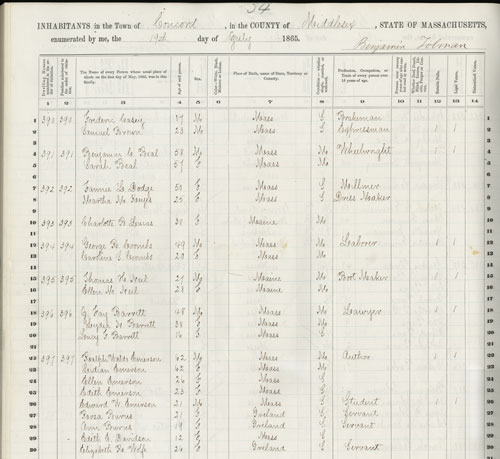
Register of the 1865 Massachusetts state census, listing the Emerson family in Concord
The Massachusetts Archives holds state census schedules from 1855 and 1865. Although the state conducted a census up to 1947, the 1855 and 1865 censuses are the only two surviving schedules.
Information contained in the state census mirrors contemporary federal returns, and is typically arranged in a similar manner. A name index for these schedules exists for many of the small towns in Essex, Middlesex, and Norfolk counties, as well as the City of Charlestown.
Federal Census
Federal census schedules date back to 1790. Recorded every ten years, they are a major resource for genealogy.
Population schedules were initially simple lists of the heads of households, but they became more detailed and expansive as the 19th century progressed. By 1850, general population schedules listed all individuals residing in a house, with data on their ages, occupations, places of birth, and real estate values. By 1850, census supervisors added new schedules with social and mortuary statistics, along with products of industry and agriculture. Every schedule was broken down by county and municipality, while large cities were further subdivided into wards and enumeration districts.
The Archives holds Massachusetts’ state copies of federal census population schedules dated 1790 through 1880, and 1900 through 1925.
- The 1890 population schedules were destroyed during a fire in Washington, D.C., in 1921. A special 1890 census of Union war veterans and widows of veterans is available at the Archives on microfilm.
You may also view printed indices for census schedules dating 1790 through 1850, and the 1890 war veterans’ census, at the Archives. The various regional facilities of the National Archives, including the Northeast Regional Branch, can provide access to all currently released Federal census schedules.
Military Records
Military records in the Archives cover conflicts dating from the 17th through the 21st centuries. These records can help identify the service of particular individuals, though they don’t provide much background on the person’s family or life. Here are some examples of research subjects spanning several regional and global conflicts:
- Payrolls and other military records can be used to document the garrison on Castle Island in Boston Harbor. Following the Revolution, soldiers remained stationed at the Castle as a defense for the harbor. These soldiers guarded the state prison that existed there between 1785 and 1798.
- The Massachusetts Archives Collection contains records from Shays' Rebellion, a period of internal turbulence dated 1786-87, as well as records of the state treasurer and the commissary general. Letters, orders, warrants, petitions, special reports, military payrolls, service certificates, financial records, and oaths of allegiance provide extensive documentation of Shays' Rebellion. Partial indices exist with names of soldiers and individuals who supplied or housed the army.
- Military records on the War of 1812 (1812-1815) are found in the records of the Governor and Executive Council; these focus on formation of militia units and commissions for officers. Records of the Massachusetts Militia in the War of 1812-1814 provides information on the militia regiments called out in 1814, in anticipation of a British attack on Massachusetts.
- The most complete list of Massachusetts men who served in the Civil War is found in the multi-volume set, Massachusetts Soldiers, Sailors and Marines in the Civil War. Civil War records held by the Archives include a variety of muster, clothing and descriptive rolls, lists of assignments of recruits to particular town quotas, enlistment papers, desertions and discharges, bounty cards, and morning reports. We also offer materials documenting the use of substitutes for draftees, and records of Massachusetts bounty payments to southern African-Americans who were recruited into the U.S. Army. Additional archival materials from this time period include the records of the State Military Agent and the letter books of Governor John Andrew, an early and strong supporter of the war effort.
- Records relating to the Spanish-American War (1898) include letters and petitions for bonuses from veterans or their families to the state treasurer, as well as data cards and pay allotments.
- You can view Army and Navy data cards for World War I and World War II Massachusetts service members, as well as rosters, oaths, and resignations of military officers from the 1780s-1900s, veterans’ grave registrations, and records from the Massachusetts National Guard through the 1940s from the Archives.
Additional State Military Records
State military records dating after 1940 are available through the State Military Records Branch of the Adjutant General’s Office. You can reach the office by mail, by phone, or by email.
By mail: 50 Maple Street, Milford, MA 01757
By phone: (508) 422-1993
By email: military.records@mass.gov
The Massachusetts Archives Collection
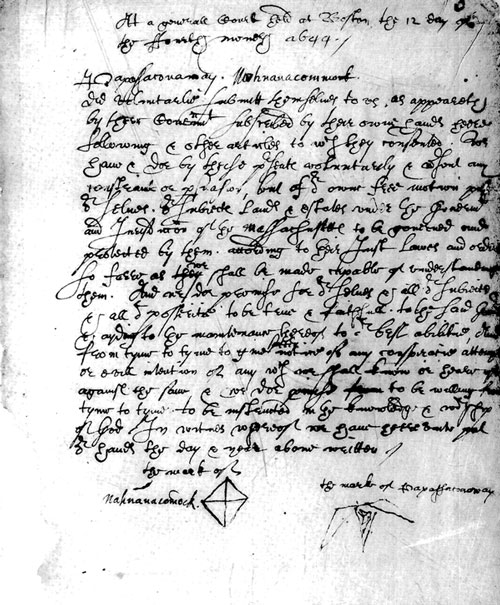
Agreement signed by Nahnaacomoc and Passaconaway, June 12, 1644, taken from Massachusetts Archives collection, volume 30
The Massachusetts Archives Collection (or Felt Collection) is an important source of records for early Massachusetts, Maine, and New Hampshire families. Documenting the development of the Massachusetts Bay government and settlement of its lands between 1630 and 1800, the collection includes original records of the Governor, Council, the General Court, the state secretary, and the treasurer.
These cover a wide range of topics of interest to genealogists: land grants; early records of divorces and contested estates; legislative papers relating to towns, including petitions and remonstrances; military records from 1643 through 1775; records of mercantile affairs; and tax valuation lists.
The records were originally bound into 328 volumes, generally arranged by topic. Most of the volumes have a table of contents and many have a name index. However, there’s no central index to the complete collection.
Searching options include a card catalog for approximately one quarter of the collection, a partial calendar index, and a partial database that provides name, location and subject access for eighteen volumes.
You can find links to a digital version of the card catalog, the database, and the original manuscripts along with their internal indexing on our Digital Records page.
Papers Relating to Maine
Maine was part of Massachusetts from the early colonial period through 1820, and there are many records in the Archives about the settlement and settlers of Maine. The Massachusetts Archives Collection contains a variety of Maine records dating from the 17th and 18th centuries, though Maine records are not grouped separately within this collection.
- There are numerous records relating to 18th century forts and Indian truckhouses (trading posts), especially for the one located at Machias.
- Records of passed and unpassed legislation contain petitions, remonstrances, reports, and correspondence relating to Maine from 1780 to 1820.
- The Eastern Lands papers focus on the settlement of public lands in the District of Maine and its separation from Massachusetts as a state in 1820. Legal, survey, and financial records of the General Court, and records of legislative commissions and the Land Office are included in the Eastern Lands papers. Researchers will also find copies of deeds for land conveyed by the Committee for the Sale of Eastern Lands and the Land Agent, records establishing land titles in disputed areas, and extensive correspondence regarding road construction, land settlement, and the development of Maine's natural resources. The Archives holds indices to several volumes of the deeds, and to correspondence dating from 1783 through 1867.
Maine vital records are not part of the Massachusetts Archives holdings. If you’re looking for Maine vital records, contact the Maine State Archives or the appropriate city or town clerk.
Plymouth Colony Records
Plymouth Colony, also known as the Old Colony, existed as a separate entity throughout most of the 17th century; it was officially merged into the Province of Massachusetts Bay in 1692. Plymouth Colony consisted of towns currently located in Plymouth, Barnstable, and Bristol counties.
The original colony records for Plymouth, including wills and deeds, are maintained at the Plymouth County Commissioners Office in Plymouth. The Massachusetts Archives holds manuscript transcriptions of these records, with accompanying name indices.
Some of the Plymouth Colony records, along with the records from the Commissioners of the United Colonies, were published in a twelve-volume set, Records of Plymouth Colony, available at the Massachusetts Archives and the Massachusetts State Library.
Records of State Institutions
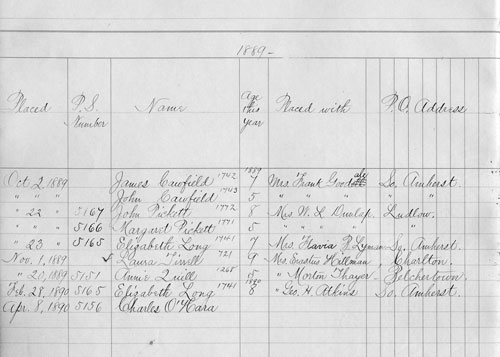
Monson Primary School, Boarding Out Register, 1889
The Massachusetts Archives holds the records of a variety of state institutions, including prisons, almshouses, mental health facilities, public hospitals and sanatoriums, and reform schools. These records were created by a number of state agencies, including corrections, youth services, public health, public welfare, and mental health.
Records vary from institution to institution, but can include documentation of case files and histories, admissions and discharges, and other information on the lives and families of people at these institutions. Please contact the Archives to determine whether records are held for a specific institution and time frame.
Please note that, per Massachusetts state laws, we may restrict access to state institution records to preserve the privacy of individuals at the institution.
Criminal offender information (CORI) is open upon the death of the individual, but medical and mental health records remain restricted. If you’re planning to visit the Archives to use these records, please contact us beforehand to determine which restrictions will apply.
Massachusetts Supreme Judicial Court Archives
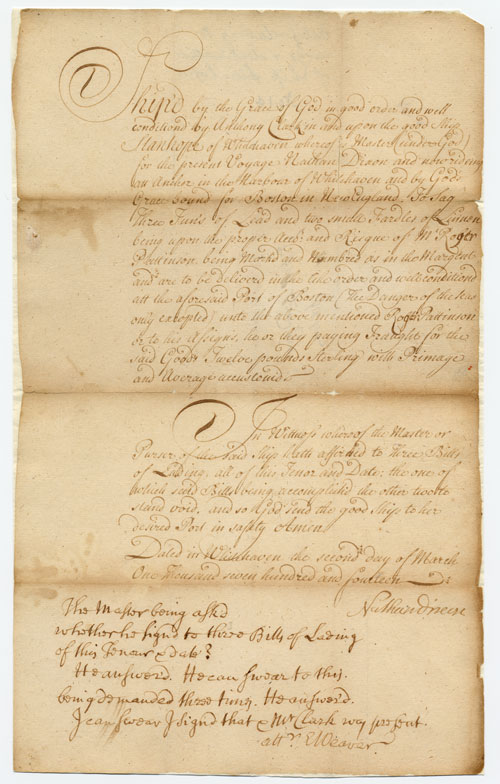
Admiralty Court, File paper, March 2, 1714
The Massachusetts Supreme Judicial Court Archives is a separate and distinct repository, collecting records from state, county, and local courts. If you have questions about judicial records, contact the staff of the Massachusetts Supreme Judicial Court Archives.
You can browse the collections of the Judicial Archives here.
The Suffolk Files
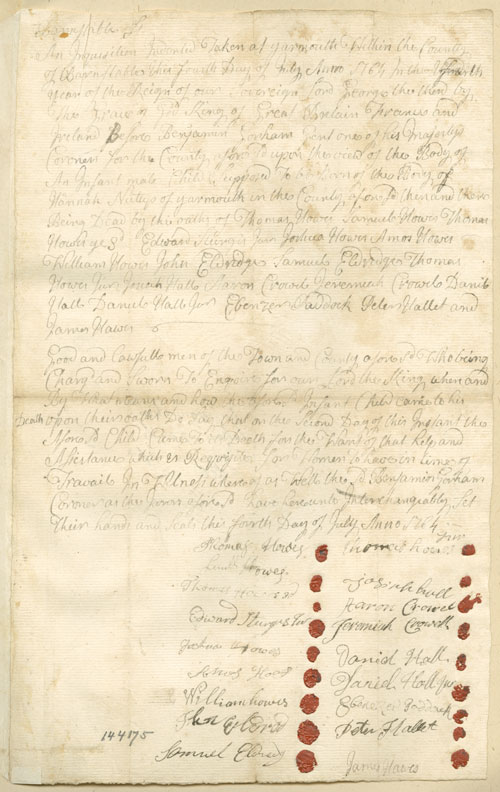
Suffolk Files, inquest from 1764
The Suffolk Files contain the earliest file papers of the Massachusetts Supreme Judicial Court and its predecessors, the Court of Assistants and the Superior Court of Judicature (1620-1800). There are also some records of the county courts and the Court of Common Pleas and General Sessions of the Peace.
Because of the circuit nature of the courts, the records contain cases not just from Suffolk County, but from Massachusetts and parts of Maine and New Hampshire. Most of the action brought before the upper courts had been appealed from lower courts throughout the region.
Archivists have prepared extensive indices of every person, place, and subject, as well as date and calendar indices. You can view microfilm of the Suffolk Files and indices in the Massachusetts Archives Reading Room and on FamilySearch.org.
Naturalizations
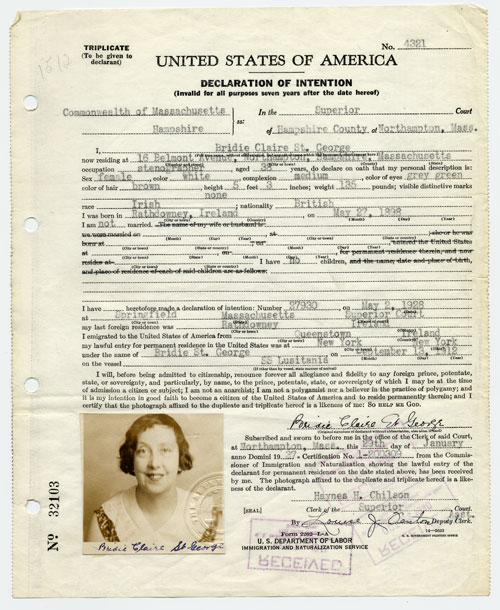
Declaration of Intent, Hampshire County
The Judicial Archives holds naturalization records, which document the process of becoming a citizen, for those persons naturalized in the state Superior Courts and local District Courts. The records usually include the declaration of intent and petition for naturalization.
Declarations filed after January 1930 generally contain a photograph of the applicant. Information found in the declaration of intent and the petition for naturalization may include:
- Name
- Address
- Occupation
- Date and place of birth
- Information about arrival in United States
- Marital status and names of children, along with their dates and places of birth
Prior to 1922, married women were included on their husband's petition. Minor children derived citizenship from their parents.
Because each court was responsible for indexing its own records, there is no statewide index for naturalization records at the Judicial Archives. When locating the proper court and date of naturalization for records between 1790 and 1906, you should consult the Soundex index to New England naturalizations, available at the Northeast Regional Branch of the National Archives in Waltham and through FamilySearch.org. You can review what’s available online, or contact the Judicial Archives staff for assistance.
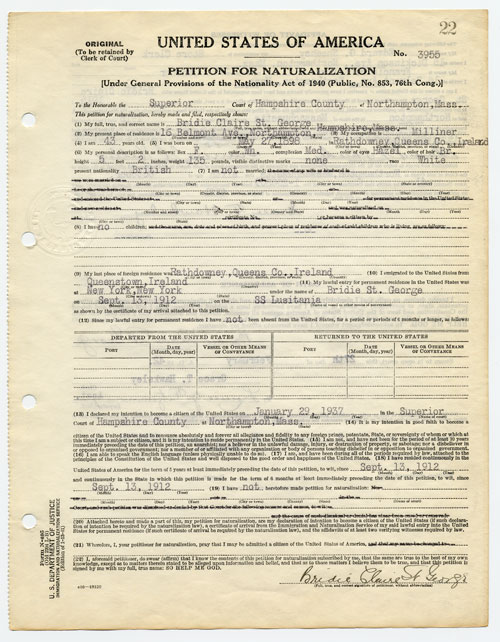
Petition for Naturalization, Hampshire County
The Archives also holds abstracts of naturalizations from state and local courts, 1885-1931, filed with the Secretary of the Commonwealth pursuant to Chapter 345 of the Acts of 1885. These records have been microfilmed; arranged chronologically by year, and indexed separately, making them awkward to use. The abstracts provide the following information about the naturalized person:
- Name
- Age
- Occupation
- Residence
- Date of naturalization and name of the affirming court
Although naturalization records do not provide much genealogical information, you may find them useful when seeking the location of the original records. Additional information on Massachusetts naturalizations is available from the Northeast Regional Branch of the National Archives in Waltham. Its holdings include:
- Photostatic copies of state and local court records (1790-1906), indexed through Soundex index cards
- U.S. District Court naturalization records (1790-1991)
- U.S. Circuit Court naturalization records (1845-1911)
Divorces
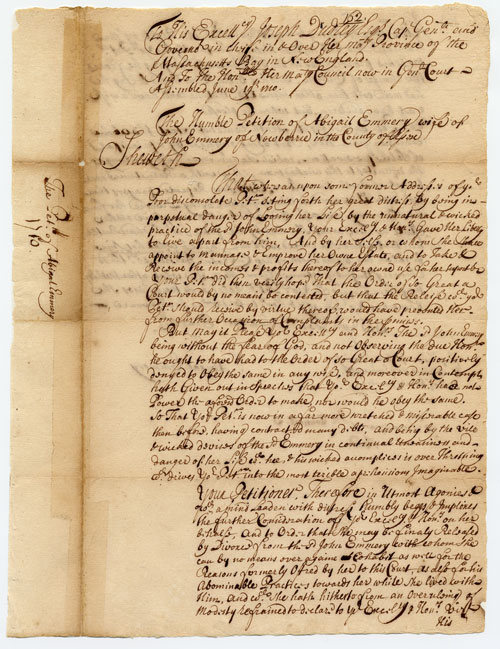
Petition of Abigail Emmery requesting a divorce, 1710
Divorce cases have been heard in Massachusetts courts starting as early as 1639.
In the colonial period (1629-1692), divorce petitions could be filed in a variety of courts, including the Court of Assistants, the General Court, and the county courts. Records of the General Court and the Court of Assistants have been published. Original records are located in the Suffolk Files, the Massachusetts Archives Collection, and the records of the county courts.
During the provincial period (1692-1775), primary jurisdiction for divorces rested with the Governor and Council, although six petitions dating 1755 to 1757 were heard by the General Court. Again, the original records will be found in the Massachusetts Archives Collection, the Suffolk Files, Council records, and county courts.
From 1775-1785 the Council had jurisdiction; records are located in the Massachusetts Archives Collection and the Council records.
In 1786, the Supreme Judicial Court was given jurisdiction over divorce cases. Records dating 1786-1796 are located in the Suffolk Files collection and recorded in the SJC record books. After 1796, summary information regarding divorces is included in the SJC record books, which are indexed and arranged by county. Case papers are also generally available.
Jurisdiction over divorce cases changed in 1887, when the Superior Courts were authorized to handle divorces. Records from this period are indexed in separate divorce docket books for the Superior Courts in the various counties.
In 1922, the county probate courts were granted concurrent jurisdiction with the Superior Courts, but since that date most divorces have been heard in county probate and family courts. Records since 1922 are maintained in the counties; an index for cases since 1952 is available at the Department of Public Health, Registry of Vital Records and Statistics (150 Mount Vernon Street, Dorchester, MA 02125). Researchers may contact the Registry of Vital Records at 617-740-2600, or through the DPH website. See the Massachusetts Judicial Archives website for more information on how to access digital copies of Divorce records.
Probate
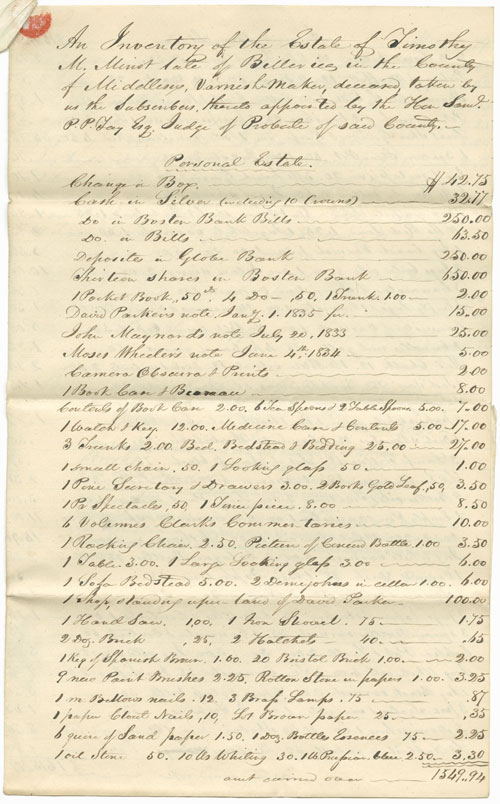
Middlesex County Probate file, inventory of Timothy Minot, 1838
Probate records, including the administration of estates, probate of wills, and the appointment of guardians, have been under the jurisdiction of the courts since the 1630s. County courts and later, county judges of probate, were responsible for these functions until 1783, when the probate courts were established. In the 19th and 20thcenturies, probate and family courts were given jurisdiction over adoptions, divorces, name changes, and domestic relations.
These records are indexed by county; there is no statewide index available. Indices will provide docket numbers, and the docket books will provide access to the record books, which are contemporary copies of the file papers. Not all of the counties have both file papers and record books available through the Judicial Archives; Check their website to see what records for which counties are available online. Researchers looking for 17thcentury probate records should also consult the Massachusetts Archives Collection, the Suffolk County probate index (for Essex County), the Suffolk Files, the Essex County Quarterly Court records, and the Middlesex Folio Collection.
Name Changes
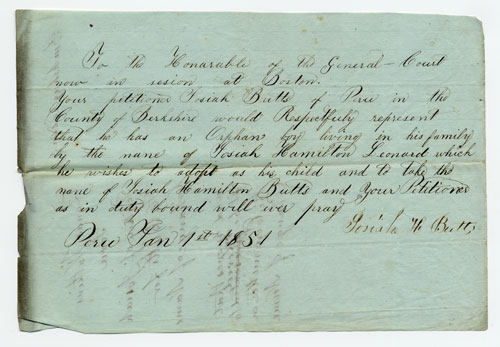
Petition requesting a name change due to an adoption, 1851
Prior to 1852, name changes were administered by the General Court. Anyone interested in a legal change of name submitted a petition to the legislature requesting the change. The petition and resulting legislation are held by the Massachusetts Archives. Petitions that did not receive legislative approval for name changes are also maintained by the Archives.
Chapter 256 of the Acts of 1851 transferred jurisdiction over name changes to the county probate courts. Annual returns of name changes were sent by the probate courts to the state secretary's office until 1900. The returns were also published annually in the printed volumes of Acts and Resolves, 1852-1913. Name changes dating between 1780 and 1892, including both those enacted by the legislature and those decreed by the probate judges, were published in the volume List of Persons Whose Names Have Been Changed in Massachusetts.
The book, which is thoroughly indexed, provides the following information: original name; new name; date of change; and the chapter number of the legislative statute or location of probate court. The Massachusetts Archives also has copies of a two volume published set of Massachusetts Name Changes from 1893-1927, searchable by “Original Names” or “Names Decreed” which identify the date and specific probate court the change was made through, and whether or not the name was changed due to an adoption.
It is important to note that the information provided above concerns only those name changes that were authorized by the General Court or probate courts. Many people changed their names informally, and did not record the change with the state government. The names of immigrants may have been anglicized upon arrival in the United States, or the spelling altered significantly, but these changes are not usually documented.
Adoptions
Genealogists should remember that many adoptions were never recorded legally. Children were frequently sent out of their families to live with other people, including relatives. Other children went to live with neighbors, but were never adopted as part of the family.
As with name changes, some adoptions prior to 1852 were enacted through the General Court. The petition requesting the adoption and any accompanying legislative papers are available through the Massachusetts Archives. Chapter 324 of the Acts of 1851 transferred responsibility for adoptions to the probate courts. Records after 1851 are either held by the Judicial Archives, or are maintained in the courts. The returns of name changes, and the List of Persons Whose Names Have Been Changed in Massachusetts note when names were changed as a result of adoptions. Access to adoption records may be restricted, so researchers will need to contact the Judicial Archives for guidance to obtain such access.
Deeds
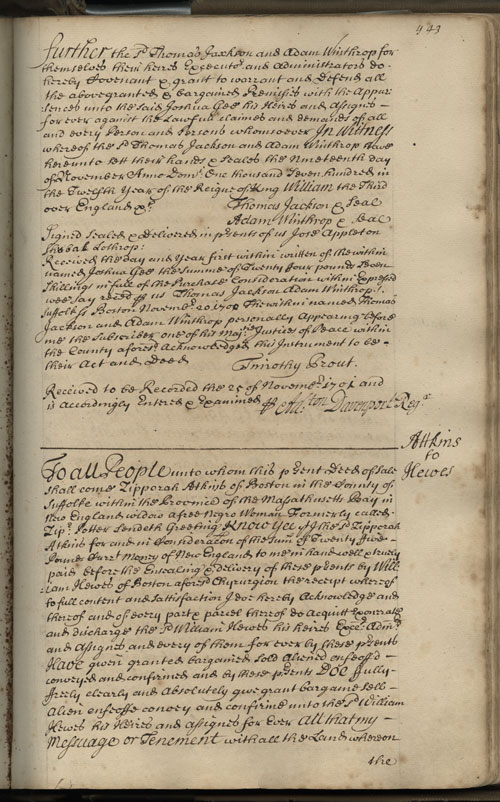
Suffolk County Deeds volume, 1701
Deeds for property in Suffolk County (1629-1800) are held by the Archives. Typically the records include the grantor and grantee, and the location and description of the property being transferred. The deeds are arranged in volumes by county and chronologically, according to the date and time they were filed. The Massachusetts Archives holds the grantor and grantee indices for Suffolk County deeds (1629-1800 only). The deeds and indexing, and records and indexing for additional years and counties, have been digitized by FamilySearch.org.
You can also contact the appropriate registries of deeds offices for information on how to access any records not available on FamilySearch, such as more recent deeds or any associated plans that may have been filed separately. Contact information can be found here.
African-American and Native American Resources
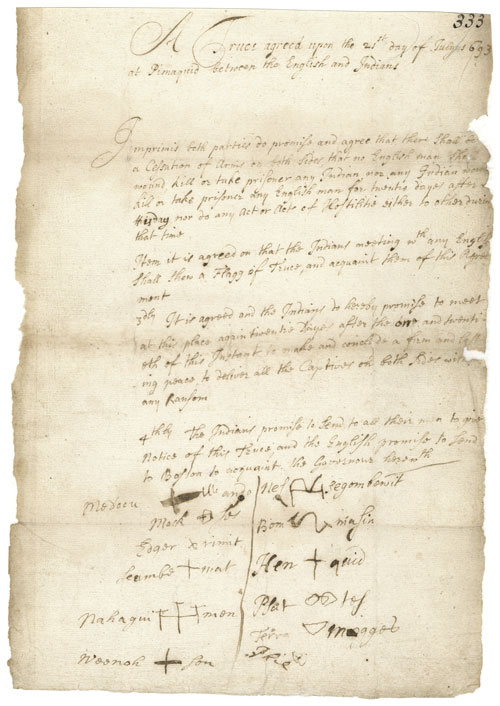
A truce agreed upon on July 21st, 1693 at Pimaquid between the English and the Indians, taken from the Massachusetts Archives Collection, volume 30
Many collections in the Massachusetts Archives are appropriate for genealogical research, regardless of the ethnic background of the family being researched. It is important to note that terms of ethnicity and color were recorded inconsistently in federal and state records. There are additional archival records that would be particularly useful to people researching African-American and Native American families. These include the 1754 slave census, early 19thcentury applications and registers of state-issued passports, and applications for southern travel (1842-1845, 1862).
The records of the Guardians of Indian Plantations provide detailed financial records of land sales and poor relief for Native Americans living in Massachusetts. A census of the Mashpee Indians, taken in 1832, is also included in the records of the Guardians. Additional census information is located in the 1861 Report Concerning the Indians of the Commonwealth, written by J.M. Earle. The report on the 1870 census of Mashpee, written by Richard L. Pease, is not held at the Archives, but can be accessed at the Massachusetts State Library.
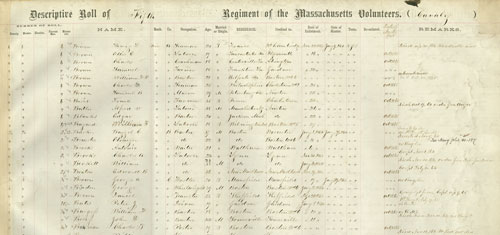
Descriptive roll of the Fifth Cavalry from 1865
Additional Collections
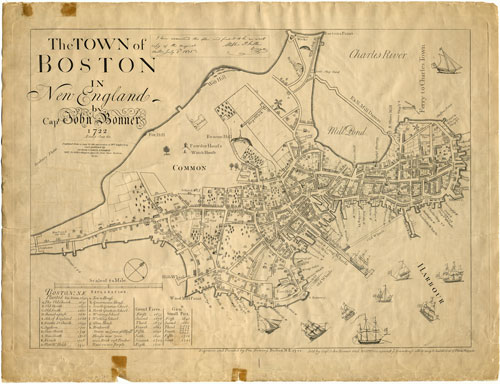
Map of Boston made by Capt. John Bonner in 1722
Other collections held by the Archives, not usually associated with genealogical research, may also provide information on families or individuals. These include collections such as maps and plans, legislative papers, and photographs relating to the construction of the Quabbin Reservoir.
Many maps, especially those of towns in Maine, include settlers' names with their residences or lots. These maps are often associated with legislative action or material in the Eastern Lands papers.
Legislative records, available for passed and unpassed bills, may include petitions, remonstrances, and copies of local records, in addition to the proposed bill. This documentation may provide information about specific individuals, especially if the legislation concerned a land grant, or the incorporation of a town, religious society, social organization, or business.
Records of the Metropolitan District Water Supply Commission include photographs of real estate in the "drowned towns"of Dana, Enfield, Greenwich, and Prescott that were taken during the construction of the Quabbin Reservoir. The collection also includes photographs of gravestones in the town cemeteries that were moved away from the reservoir site.
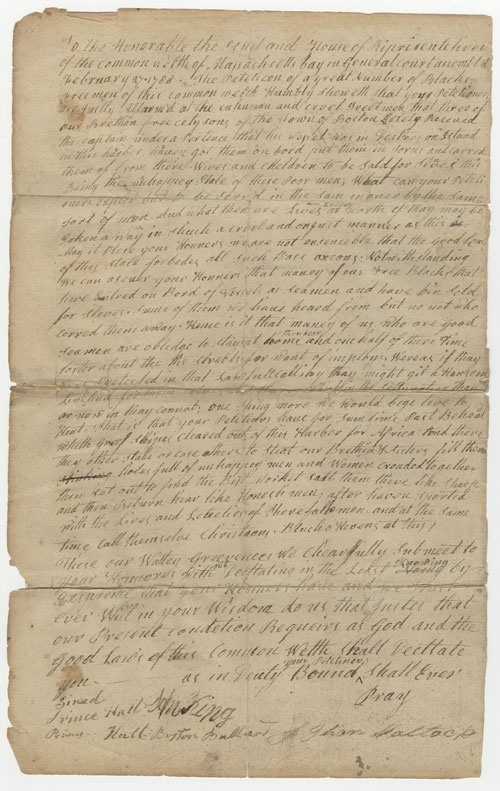
Prince Hall's petition, resulting in an act abolishing the slave trade in Massachusetts, Chapter 48 of the Acts of 1787
